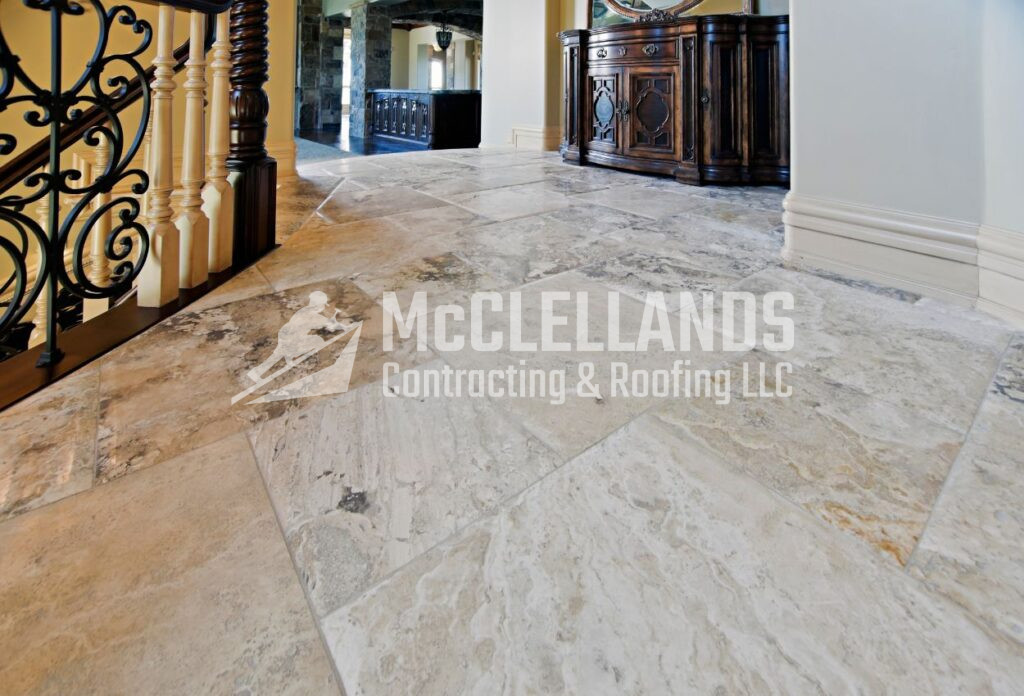Choosing the right flooring type for your home is an important consideration for both its comfort and appearance. But with so many options available to choose from, homeowners generally face the common confusion around which flooring material is best for their home.
In order to help you out, this article will address the most common flooring materials that you can choose from, and how to know which one is the right one for your home. If you are looking forward to a no-obligation discussion with a flooring experts, call our team today at (412) 353-5660.
*Please note, price ranges listed in this article may not reflect the final cost of your project. Prices are subject to change based on various factors such as local labor rates, material quality, and more. All costs established in this article are rough estimates based on average industry rates.
What Are The Different Types Of Flooring Materials You Can Choose In 2025
Before directly getting into how to choose the right flooring material for your home, we will quickly discuss the costs, lifespan, durability, and suitability of the most common options that you can choose from in 2025.
#1 Hardwood Flooring

Natural hardwood flooring remains one of the most sought-after flooring materials because of its beautiful appearance and naturally tough durability.
You can find wooden floors in solid and engineered options. Hardwood flooring generally costs between $5 to $25 per square foot installed, and engineered wood flooring can cost you around $6 to $23 per square foot.
With proper maintenance, hardwood floors can last 50+ years and can be refinished multiple times during their lifespan. Many find that this type of flooring material performs really well in living rooms, dining rooms, and bedrooms, but it should be avoided in moisture-prone areas like bathrooms and basements.
#2 Ceramic and Porcelain Tile
Tile continues to dominate the market in 2025 as well, and this is because of its performance against moisture and outstanding durability.
Installers generally charge $12 to $35 per square foot for ceramic tiles and $15 to $50 for porcelain.
With proper maintenance, both ceramic and porcelain tiles can work well for more than 50 years. This makes them a wise choice for bathrooms, kitchens, and other moisture-prone areas. The extensive range of designs and patterns makes tile floors one of the most versatile options available.
#3 Laminate Flooring

Laminate flooring tends to be seen as the affordable version of hardwood flooring. Laminate floors can even replicate the appearance of hardwood floors, but this flooring material is made by compressing a thin layer of real hardwood and only two to three layers of plywood.
You'll spend between $2 to $8 per square foot for installation, and this flooring material can last 15 to 25 years.
These floors tend to be better suited to any room that’s not the bathroom or kitchen. However, manufacturers have improved laminate flooring materials in the past few years, enhancing their water resistance and durability.
#4 Carpet Flooring

Carpet is a common flooring material that is best for living rooms or bedrooms. However, this option is harder to maintain, requiring you to be careful about spills and moisture. Regardless, they’re favored by many homeowners for bringing so much comfort.
The cost of installing carpet flooring can be anywhere between $3 and $10 per square foot, and quality carpet can last 5 to 15 years with proper maintenance.
You can choose from cut pile, loop pile, and cut-loop combinations, each suited for different applications in low-traffic areas.
#5 Natural Stone Flooring

Homeowners who want to add a premium appearance to their home will find natural stone among the finest options available. These flooring options are loved for the way that each installation brings unique results because of the pattern and design variations.
Stone flooring generally costs between $15 and $75 per square foot for high end options such as marble, granite, and quartzite, while other options such as limestone can go for around $3 to $10 per square foot.
How Do You Choose The Right Flooring Material For Your Home
While it can be hard to make a choice with so many options, here are some considerations that will ultimately help you with your decision:
#1 Consider The Room's Purpose and Traffic Level
You should match your flooring choice to each room's specific use. High-traffic areas like entryways and hallways need materials that can withstand constant foot traffic.
Different flooring materials provide different levels of durability, so choose the flooring materials that pair well with your usage patterns.
#2 Assess Moisture Exposure
You must carefully calculate moisture levels while choosing the right flooring material for different spaces in your home.
Consider installing water-resistant materials like vinyl, tile, or properly sealed stone in bathrooms, kitchens, and basements. Knowing the amount of moisture a room is exposed to on a regular basis will help you choose the most appropriate flooring material for your home.
#3 Determine the Type of Maintenance Requirements You’re Willing To Handle
Different flooring types need varying levels of care. Vinyl and laminate need minimal maintenance, while hardwood and natural stone require regular maintenance to preserve their beauty.
Consider how much time you can give to floor maintenance when making your final decision.
#4 Choose The Right Installation Methods
Your choice of flooring will affect the type of installation you need, and the final cost of a project. Some materials are better suited for DIY installation, while others require professional expertise.
You should assess both material and installation costs in your decision-making process.
#5 Account for Lifestyle Factors
Your household's daily activities should also influence your choice of the right roofing material. If you have pets or children, consider scratch-resistant materials like vinyl or laminate.
Think about things like comfort, noise reduction, and durability while choosing the right flooring material for your home.
#6 Consider Climate and Environment
Your local climate will impact how different flooring materials perform. Humid areas require different flooring materials compared to dry climates.
We also recommend you pay special attention to the behavior of different flooring materials in relation to temperature changes and direct sunlight exposure.
#7 Budget Considerations
While you should consider initial costs, it is smarter to focus on the long-term value before choosing the best flooring material for your space. Some flooring options cost more initially but provide better durability and extended lifespan.
As a homeowner, you should consider both immediate and long-term costs as you make your decision.
#8 Style and Design Preferences
Your flooring should also complement your existing decor and personal style preference. This is because different flooring materials suit certain aesthetics better than others.
Therefore, you should think about the impact of your flooring material choice on the overall design scheme of your home.
#9 Impact On Your Home's Value
Your choice of flooring can also affect your home's overall resale value. Traditional materials (like hardwood and stone flooring) generally perform well and add nice value to your property.
You may also want to consider how your flooring choice could influence your home's future value if you intend to sell.
You might also like, 5 Common Flooring Remodel Mistakes And How To Avoid Them
Considerations For Flooring Layout And Installation
Along with considering the right material for your floors, you’ll also have to consider the layout and installation method that best suits your home and your plan.
#1 Subfloor Requirements
The condition and type of subfloor you have will limit your flooring options. Concrete subfloors need special moisture barriers and leveling, while wooden subfloors require proper structural support and preparation.
Some materials require perfectly leveled subfloors, while others can still be installed if the subfloor has minor imperfections. If this part confuses you, reach out to a professional flooring expert who can check your subfloor and recommend appropriate materials.
#2 Installation Patterns and Layouts
You can seriously change your room's appearance with different installation patterns. You can choose from traditional straight layouts to herringbone patterns in hardwood or diagonal tile installations.
#3 Transitions Between Different Flooring Types
Most homeowners include multiple flooring materials throughout different rooms. You'll need to plan how these materials transition between spaces for both appearance and function.
Our professional installers can recommend appropriate transition strips and methods to blend different flooring types seamlessly while maintaining proper height differences and wear protection.
How To Maintain The Lifespan Of Your Floors
Maintaining the lifespan of your floors is pretty simple if you follow some basic routine practices.
Every day, you should sweep or vacuum using the right method for your specific type of floor, and clean up any spills right away using cleaners that are safe for your flooring.
As the seasons change, you should be attentive to your floors depending on the material they’re made out of. For example, keep an eye on the humidity levels if you have wooden floors, or be extra careful about winter salt on stone floors.
While doing these daily maintenance practices yourself is important, it's also a good idea to have professionals deep clean or refinish your floors every couple of years.
Different types of flooring need different kinds of professional care, so check with your local flooring expert to find out what's best for your specific floors.
Get Professional Floor Remodeling In Pennsylvania Today
At McClellands Contracting and Roofing, LLC, we are your local home improvement company in Pittsburgh.
We have been providing high-quality floor remodeling in Pittsburgh and the surrounding areas in Pennsylvania.
We understand the importance of choosing the right flooring material for your space. This is why our experienced team is here to help you evaluate your flooring options and choose the perfect fit for your specific needs.
Contact us today, at (412) 353-5660, to discuss your flooring project with our experts and receive a free consultation on the best flooring choices for your home.




